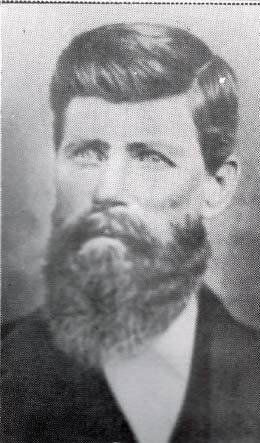On November 14, 1879, the Washington Territorial Legislature incorporates the Klickitat County city of Goldendale in South Central Washington. The newly incorporated town consists of 480 acres of land. Its name honors the pioneer family that founded the town.
A Central Resource
Almost exactly one year before, Klickitat County residents had voted to make the town the county's seat. From December 20, 1859, until the 1878 election, Klickitat's county seat was located at pioneer Alfred Allen's (1802-?) farm near Rockland Flats, across the Columbia River from The Dalles, Oregon. This location was always considered temporary due to the initial dearth of residents in the county. Until settlement patterns were established, the territorial legislature had chosen the location as a kind of legally necessary placeholder -- if Klickitat was a county, it needed to have a county seat.
The town of Goldendale was established in 1872 by John J. Golden (1826-1906). John Golden and his wife, Jane Parrott Golden (1845-1921), were among the area's first non-Native settlers. John Golden had the property surveyed and platted, filing plat maps with the county auditor on March 13, 1872. Goldendale was the only town in the vicinity, providing services for the surrounding farms and homesteads, which were otherwise isolated.
Golden Gifts
On the day the legislature incorporated Goldendale, Golden donated title to a parcel of land on which Klickitat County could erect a courthouse. He had previously donated land for the town's first church, and also donated eight lots as an incentive for whoever built the new town's first store. This early construction seeded Goldendale's growth.
An Illustrated History of Klickitat, Yakima and Kittitas Counties, published in 1904, described Goldendale's geographic delineation:
"That portion of land known and designated upon the surveys of the Unites States in the Territory of Washington as the south half of the southwest quarter of section sixteen, and the south half of the southeast quarter of section seventeen, and the northeast quarter of section twenty, and the northwest quarter of section twenty-one, township four north, range sixteen east of the Willamette Meridian" (131).
Organizational Details
The legislature appointed temporary officers who were to serve until the new town's first election took place in April 1880. They were Thomas Johnson (1839-?), mayor; W. F. Ames, recorder, ex-officio city assessor, and clerk; and Homer Sears (1848-?), John Golden, W. B. Chatfield (ca.1826-?), Justin Scammon (b.1827-?), and D. B. Gaunt (1839-?), council officers.
According to a 1972 centennial history of Goldendale, when the town was incorporated its businesses included "2 general merchandise, 2 flour mills, 2 planing mills, 1 hardware, 1 furniture, 2 drug stores, 1 grocery, 1 harness shop, 4 blacksmith shops, 2 jewelry stores, 2 hotels, 1 barber shop, 1 print shop and 1 newspaper and printing shop, 2 livery stables, 1 milliner, 3 contractors, 3 realtors, 2 law firms with two lawyers each, 6 physicians, and the post office" (100 Golden Years, 13).
After Washington became a state in 1889, many of the towns that had been incorporated under territorial rule voted to reincorporate under state law. Goldendale was one of these, incorporating as a city of the fourth class on April 15, 1902.

